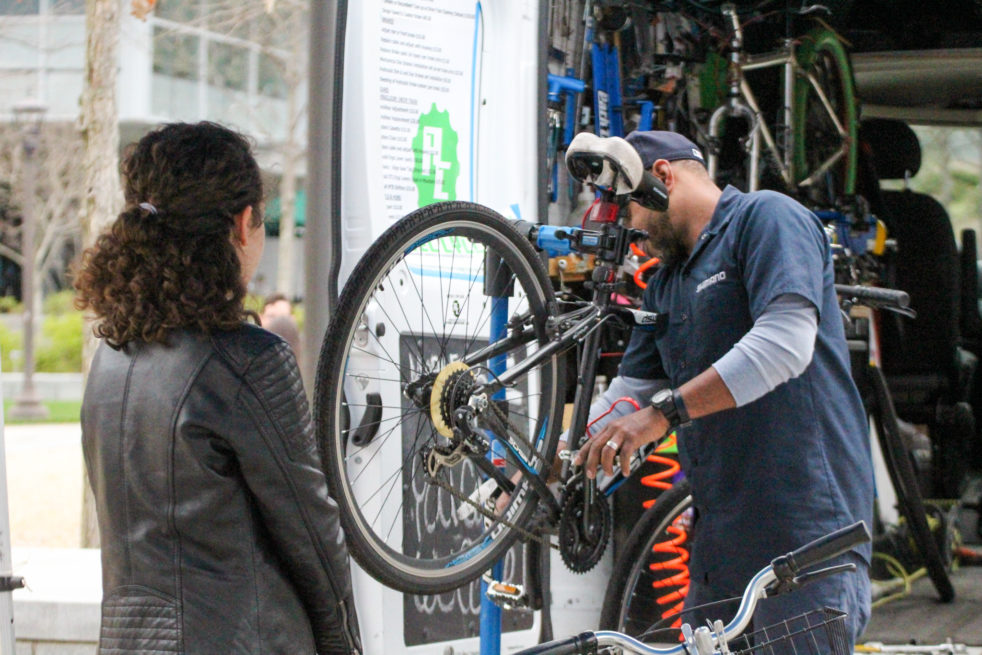Riding a bicycle is an increasingly popular mode of transportation, and it comes with several benefits not just for the riders but also for their communities and even the world. An effective mode of transportation and exercise, biking can boost general health and wellbeing while also reducing one’s carbon footprint. This past semester, Tech’s campus saw many students use a bicycle to get to their classes, connect with others, exercise and have fun!
For its standards of biking infrastructure, education and events, the League of American Bicyclists have even named Tech a “Gold Level Bicycle Friendly University.” In fact, the Institute has created a “Bicycle Master Plan” that is gradually being set in motion. This plan, a comprehensive 104-page document available for free at space.gatech.edu/bicycle-master-plan, is gradually being put into effect. Its goal is to promote a more bike-friendly campus and to ensure the safety of cyclists and non-cyclists alike.
The Institute hopes to achieve this goal by making biking more visible on campus, improving biking access to campus, developing and supporting bike culture, establishing dedicated funding and identifying and clarifying partner roles. The Technique spoke to Kristine Ferguson, fourth-year ENVE, who has worked for Outdoor Recreation at Georgia Tech for two years.
More commonly referred to as ORGT, the group is a facet of the Campus Recreation Center (CRC) and is dedicated to promoting a healthy campus lifestyle by providing students with the resources they need for a wide range of outdoor activities, from kayaking to backpacking to many more. Fergusson shared her insight into Tech’s growing bicycle community as well as what can be done to make it even better.
“I’d love to see more bike infrastructure around campus,” said Ferguson.
From ORGT’s space in the CRC, students can even rent equipment. The group also organizes several mountain biking and bikepacking trips throughout each semester. Not only does the group host weekly meetings and biweekly night rides, it even offers opportunities for more experienced cyclists to go on higher adventure trips.
“In August, nine people are going to Newfoundland,” Ferguson shared. “They are going to bike across the island in Canada, so that’s going to be pretty fun!”
The city of Atlanta has also garnered attention for the prominent use of biking. As of 2016, Atlanta has been ranked by Bicycling Magazine as one of the top 50 biking cities.
“There’s still a lot of infrastructure changes that the city and state need to make,” says Kris Dunbar, speaking about Atlanta’s bicycling infrastructure. An Atlanta resident for 25 years, Dunbar is the owner and lead technician for Aztec Cycles, based out of Stone Mountain Georgia, as well as Clutch Bicycle Shop in Atlanta’s West End.
“The city has been making some leaps and bounds, with the Beltline, bike lanes, traffic speed limits,” Dunbar continued. “It’s slow and go, but the sad part about it is the initial infrastructure was never set up for bicycles so we’re working backwards.”
Dunbar also shared insight into Aztec Cycles, his mobile repair shop which has traveled all over the state, including Tech. In order to help students with bike repairs and tune-ups, Dunbar has transported Aztec Cycles to participate in the campus’s community market. Dunbar explained that flats, brake adjustments and gear adjustments are the most common repairs on campus.
His advice for keeping your bike in tip-top shape? “Keep up with your air pressure and don’t leave it in the rain are the two most basic things you can do.”
